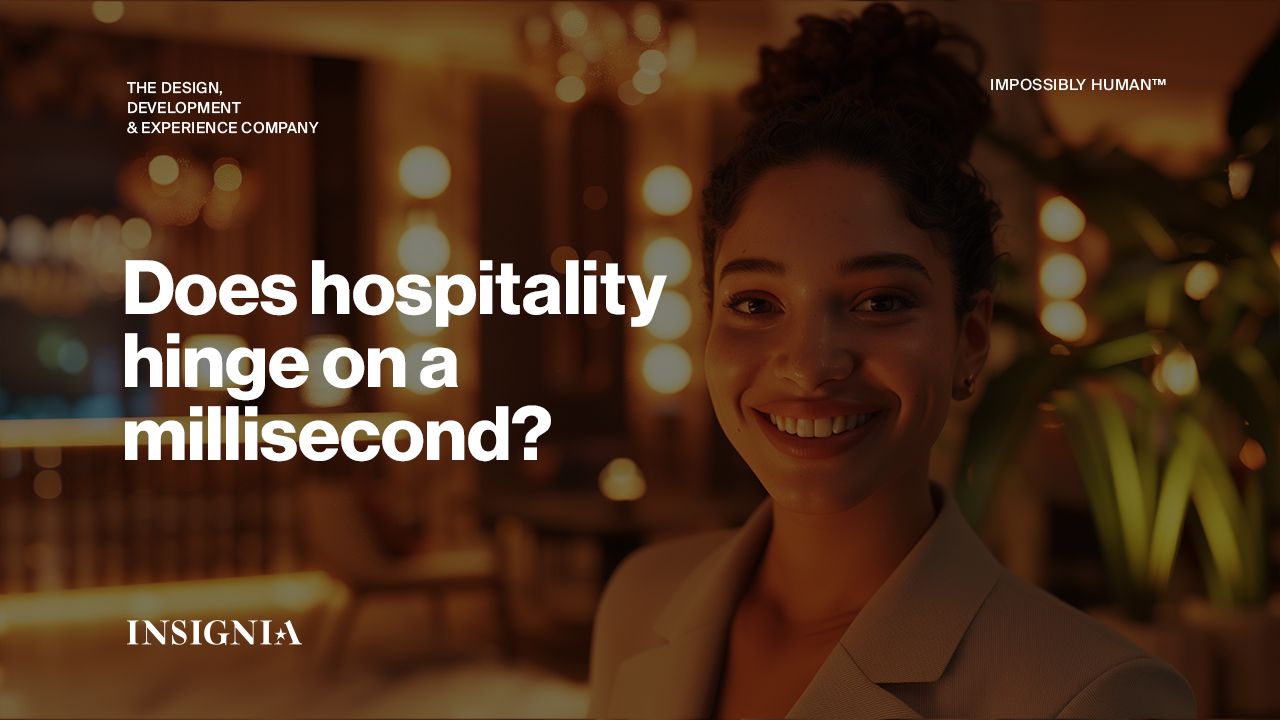First impressions, those devilishly decisive, occasionally unkind slivers of judgment, are as fleeting as they are potent. They dart in, make their mark, and before you know it, they’ve lodged themselves in the recesses of the mind, ready to define every subsequent interaction.
The old adage insists that you only get one chance to make a good one, and in the endlessly fascinating world of psychology, we’ve come to realise just how fleeting that chance really is. A mere tenth of a second.1 That’s all it takes for someone to form a judgment: whether they find you competent, charming, or, indeed, whether they’d prefer you simply evaporate. In that infinitesimal blink, our brains are working with the precision of a Swiss watch, sizing up the situation before us with remarkable speed, and unnerving accuracy.
For those in the hospitality industry, this little nugget of knowledge is pure gold. It reveals that first impressions are not just critical, they are the very gateway to the entire guest experience. Hoteliers have long understood the importance of these initial moments, crafting experiences that make each millisecond sing with the beauty of a well-composed symphony. The warm glow of meticulously calibrated lighting, the ethereal whisper of signature scents in the lobby, the impeccable tailoring of uniforms, and the sublime symmetry of a finely designed space. Each sensory detail conspires to envelop guests in a sense of tranquillity, far removed from the cacophony of daily life.
Enter the Futurists
We could continue to wax lyrical about ways to perfect the first impression. Perhaps we might suggest interactive environments: lobbies that respond to a guest’s very presence, with lighting that softens like a lover’s gaze, or music that shifts ever so gently to their emotional tempo. AI-driven emotional assistants? A marvellous touch, able to read micro-expressions and the cadence of a guest’s voice, whispering subtle suggestions to the front desk team to adjust their approach with balletic grace.
But (and here’s the rub), as wonderful as all these shiny new toys may be, they pale in comparison to the one thing that truly makes the difference: human sincerity.
For all the gadgets and gizmos, the carefully chosen fragrances and expertly modulated lighting, nothing – not a single pixel of AI or fibre-optic wizardry – can replace the warmth of a genuine smile, the quiet authenticity of a person’s voice. Research tells us that humans can detect insincerity in as little as 33 milliseconds.2 In an instant, we know if someone is being genuine, and no amount of electronic pyrotechnics can change that simple, immutable truth.
The Human Touch – The Beating Heart of Hospitality
This brings us to a crucial, yet often-overlooked point. Hospitality is not merely about treating guests well; it thrives on the principle of treating staff well. A happy, engaged employee is the very bedrock upon which exceptional guest experiences are built. Which is why the following approaches to nurturing staff happiness, and by extension, creating authentically joyful guest interactions, could stand us all in good stead:
1. Ownership of Initiatives
The endowment effect tells us that people value what they own. By giving staff ownership over guest-related initiatives, whether it’s a new greeting protocol or a creative project, employees are far more likely to be invested in their success.
2. Tailored Emotional Support Programmes
Develop personalised emotional support programmes for staff that mirror the care extended to guests. From one-on-one wellness coaching to access to mental health services or even wellness retreats, these programmes would be designed to meet individual emotional needs.
3. Personal Legacy Projects
Create opportunities for staff to work on legacy projects, be it spearheading a sustainability initiative or leading a community outreach programme, allowing employees to leave their personal mark on the world.
4. Future-Oriented Celebrations
Affective forecasting, or the anticipation of future emotional states, can be a powerful tool. Instead of simply celebrating past achievements, hospitality managers could host future-oriented celebrations for staff, recognising upcoming milestones and career aspirations, instilling a sense of purpose and optimism in employees.
The Irreplaceable Human Spirit
As dazzling as technological advances may be, and they are dazzling indeed, there is truly no substitute for the human spirit. Hospitality, at its very core, is about people. It’s about creating moments of genuine connection, warmth, and sincerity. As much as we can marvel at the wonders of AI, lighting, and sensory design, it will always be people – human beings – who make those first, critical moments count. Just as we instinctively know in a fraction of a second whether someone is sincere, guests will always remember the warmth of the interactions they experience.
So let us not simply invest in technology, but in the happiness, well-being, and authenticity of the people who are hospitality. At the end of the day, no machine, however clever, can replicate the ineffable joy of a heartfelt interaction, the indelible magic of the human touch.
Insignia Worldwide crafts new realities at the intersections of strategy and storytelling, by challenging what is humanly possible and creating what is Impossibly Human.TM
1 Janine Willis and Alexander Todorov: ‘Psychological Science’
2 Pacific Standard: ‘Your Brain Decides Whether to Trust Someone in Milliseconds’
